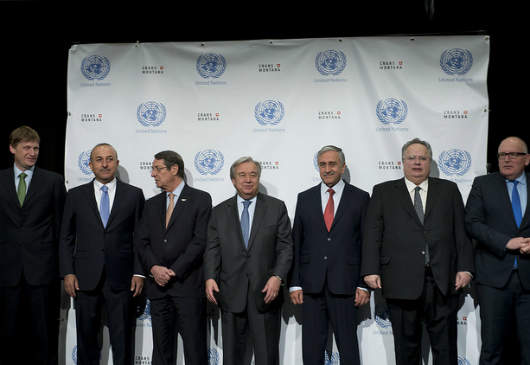 Greece attended the Conference in Crans-Montana determined to contribute in every possible way to resolving the Cyprus problem, and in the hope that everyone would act in such a direction.
Greece attended the Conference in Crans-Montana determined to contribute in every possible way to resolving the Cyprus problem, and in the hope that everyone would act in such a direction.
But Turkey's conduct dashed any hopes anyone had that there would be a change in its stance. Just as Turkey abandoned the first Conference, in Geneva, it torpedoed the second.
Turkey drove the Crans-Montana conference to an impasse. A very characteristic feature of its stance was the revelations Turkey made during the dinner on 6 July, when the UN Secretary-General expressed his intention of setting down in writing the points of convergence that had been achieved. His goal was to shape a framework for agreement so that the conclusive negotiations could continue, with Greece’s consent, in New York. But this was not possible, because when the critical moment was reached at the Conference, Turkey resolutely refused to allow a number of promises it had made to the Secretary-General to be set down in writing.
This was typified by the Turkish side categorically refusing to accept the abolition of the inexistent “rights” of intervention it invokes. An abolition that, a short while earlier, at a bilateral meeting with the UN Secretary-General, Turkey had indicated it would accept at the dinner that was to follow. And this was because Turkey was aware that all of the participants apart from Turkey itself and the Turkish Cypriots demanded their abolition.
We remind that, three days earlier, the Turkish Foreign Minister had bluntly revealed Turkey's position, according to which Ankara "needed these rights so that it can intervene throughout Cyprus whenever it deems it necessary."
The Turkish side also revealed during the dinner of 6 July that it wants to continue the violations in the name of the Treaty of Guarantee, to ensure and perpetuate its military presence in Cyprus. And all of this was in spite of promises to the contrary made to the UN Secretary-General on the afternoon of Thursday, 6 July. Promises that, in hindsight, are revealed to have been an effort to create the false impression that it was ostensibly willing to negotiate. But lies never get one very far, and the truth always finds a way to come out.
As soon as Turkey was faced with the Secretary-General's proposal for a binding written record of the potential compromises, it was forced to reveal and admit its real positions and intentions. It became evident that, throughout the duration of the multilateral negotiations, Turkey had had no intention of compromising. Moreover, it also became evident that, through its stance, Turkey sought to deceive the UN Secretary-General. Immediately after these revelatory developments, the UN Secretary-General was forced to declare, in short order, that the Conference had ended.
So the Conference ended with the revelation/confirmation of Turkey's true intentions, which run counter to international law and the resolutions of the UN.
We reiterate that Greece will continue to work relentlessly, with all means at its disposal, for a just and viable solution to the Cyprus problem, in close cooperation with the Republic of Cyprus, the UN and the European Union. And it calls on all of the parties to the Conference to show responsibility, respect for international law, and self-restraint.
July 9, 2017


